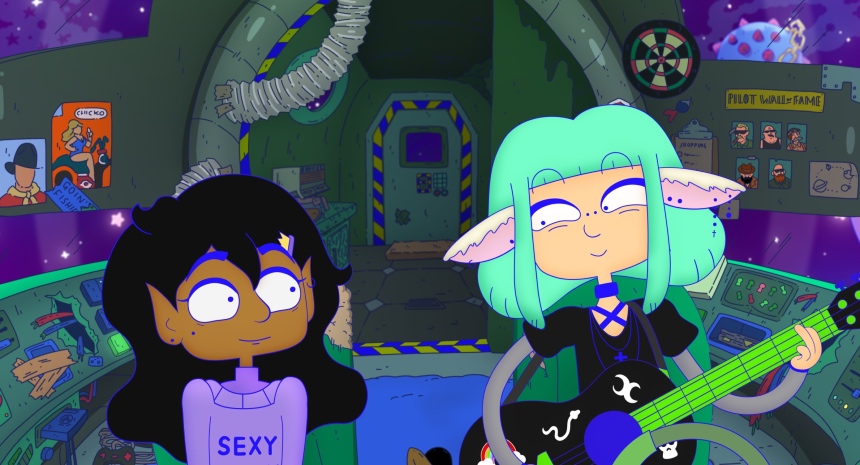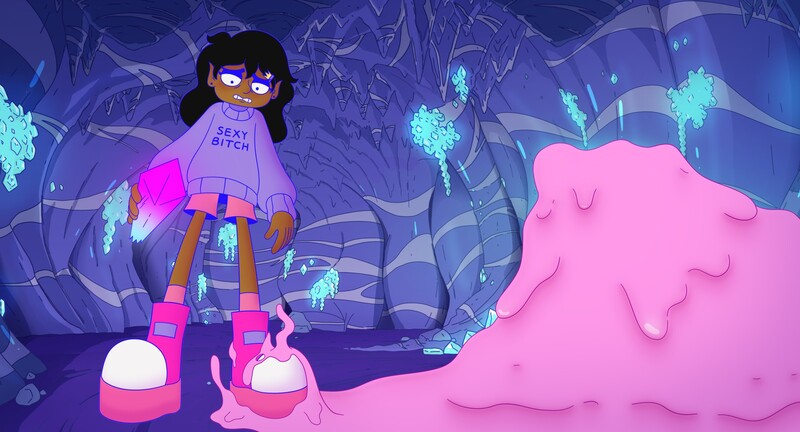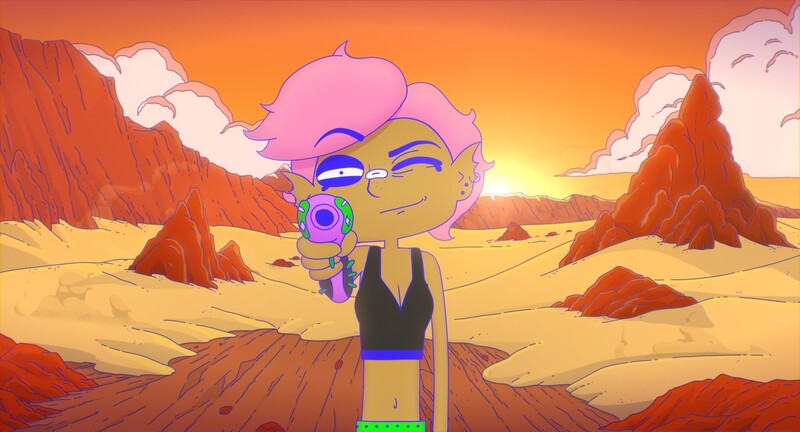Berlinale 2025 Review: LESBIAN SPACE PRINCESS Merges Irreverent Humor with Queer Sci-Fi Coming of Age
Leela Varghese and Emma Hough Hobbs directed the funniest film of this year's Berlinale, a campy queer coming-of-age space opera.

The funniest film at this year’s Berlinale has been Australian queer coming-of-age animation Lesbian Space Princess, which tackles a self-discovery story framed as an “inter-gay-lactic” adventure. Balancing irreverence with an uplifting spirit, the film unfolds as a fast-paced, humor-driven space quest that explores themes of self-acceptance and identity through a comedic lens.
Directed and written by Leela Varghese and Emma Hough Hobbs, the film blends campy sci-fi adventure with a playful subversion of genre tropes. The story follows Princess Saira (voiced by Shabana Azeez), an introverted royal from Planet Clitopolis, who embarks on a reluctant hero’s journey.
The musical space opera is less a romance and more a story of an introvert stepping beyond their comfort zone. Saira embarks on a hero’s journey aboard the Problematic Ship, an AI-controlled spacecraft voiced by Richard Roxburgh, whose misogynistic quips provide a running commentary. Traveling across the "gaylaxy," Saira encounters an eclectic mix of characters, including rocker Willow (Gemma Chua), double-faced drag queen Blade (Kween Kong), and her own Head Monster.
Directors Varghese and Hough Hobbs bring distinct artistic sensibilities to their feature debut. Hough Hobbs, an experienced animator and production designer, shapes the film’s visual identity in a vein of Adventure Time. Varghese, a musical comedian, lends a comedic rhythm to the script, blending absurdist humor with musical interludes that complement the film’s character-driven storytelling.
Lesbian Space Princess aligns with the duo’s broader body of work, which frequently explores queer identity, representation, and humor. This feature expands their storytelling ambitions while retaining the irreverence and character-driven focus that defines their earlier projects. It also reflects a broader movement in contemporary animation that challenges genre conventions and foregrounds voices historically marginalized in the medium.
Visually, the film embraces an intentionally unpolished aesthetic. Working within budget constraints, the animation prioritizes expressiveness over technical refinement, favoring exaggerated movement and a vibrant, bubblegum-colored palette. The character designs lean into a stylized, cartoonish approach that enhances the film’s comedic tone while nodding to the low-budget anime tradition.
Lesbian Space Princess blends personal stakes with genre satire, using humor to deconstruct familiar sci-fi tropes while making direct commentary on gender and identity politics. The antagonists, the Straight White Maliens, serve both as a narrative obstacle and a satirical embodiment of exclusionary social dynamics. Beyond their fixation on enforcing rigid norms, they are also inexplicably obsessed with the trading card game Magical the Gathical with busty sorcerer.
Varghese and Hough Hobbs infuse the film with an eclectic mix of humor, from puns and sight gags to self-aware nods to genre conventions, all woven into a comedic fabric that shifts between cringe and absurdity. Yet beneath the satire and irreverence, the story remains grounded in something more personal. Rather than centering on romance, the narrative prioritizes self-discovery, reworking the familiar structure of a lesbian rom-com into a broader, introspective coming-of-age journey.
Despite its Cartoon Network-inspired aesthetic, Lesbian Space Princess does not temper its content to fit a family-friendly mold. Varghese and Hough Hobbs fully embrace the film’s adult sensibilities, incorporating an unfiltered flow of profanity, visual gags involving nudity and genitals, and moments of violence that flirt with the nihilistic humor of Rick & Morty. This willingness to push boundaries adds to the film’s appeal as an adult animation, contrasting its candy-colored style with unexpectedly sharp edges.
Both playful and irreverent, Lesbian Space Princess is a raucous musical sci-fi that thrives on a relentless rhythm of humor. Its blend of absurdity, zaniness, and adult comedy propels the film’s energy, ensuring its satire remains as pointed as its self-aware charm.
Lesbian Space Princess thrives on contradiction: it is both sweet and profane, ridiculous and heartfelt, an affectionate genre send-up and an earnest story of self-acceptance. Its relentless joke cadence, bouncing between absurdist wordplay, slapstick, and pointed social satire, ensures there is never a lull in its energy. The result is an animated space opera that is as raucous as it is charming, proving that even the most candy-colored worlds can still pack a rebellious, boundary-pushing punch.
Lesbian Space Princess won the Teddy Award for Best Feature Film and came second in the Panorama Audience Award for Fiction Film at the Berlinale 2025. Visit the film's page at the official festival site for more information.
Lesbian Space Princess
Director(s)
- Emma Hough Hobbs
- Leela Varghese
Writer(s)
- Emma Hough Hobbs
- Leela Varghese
Cast
- Kween Kong









